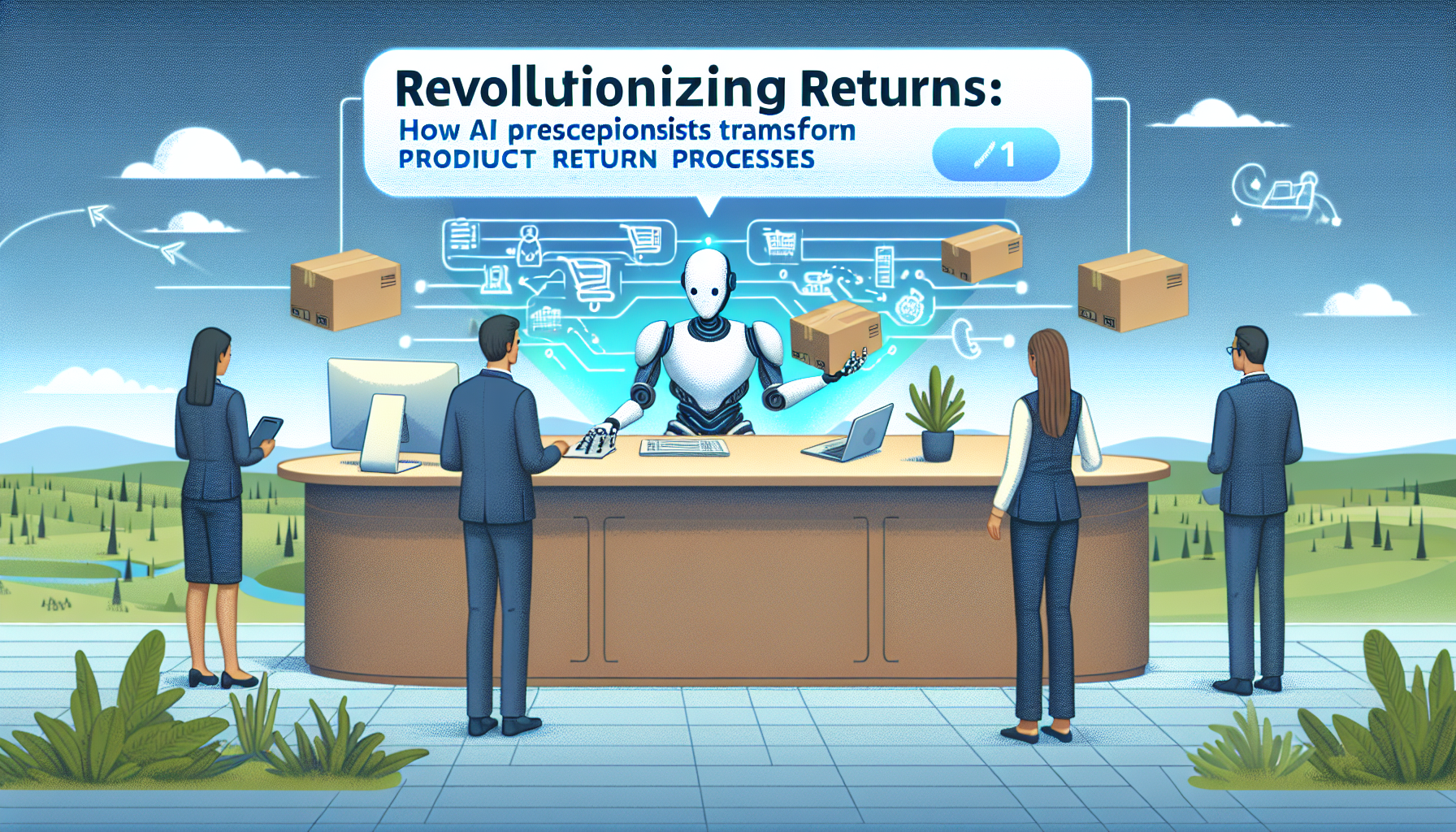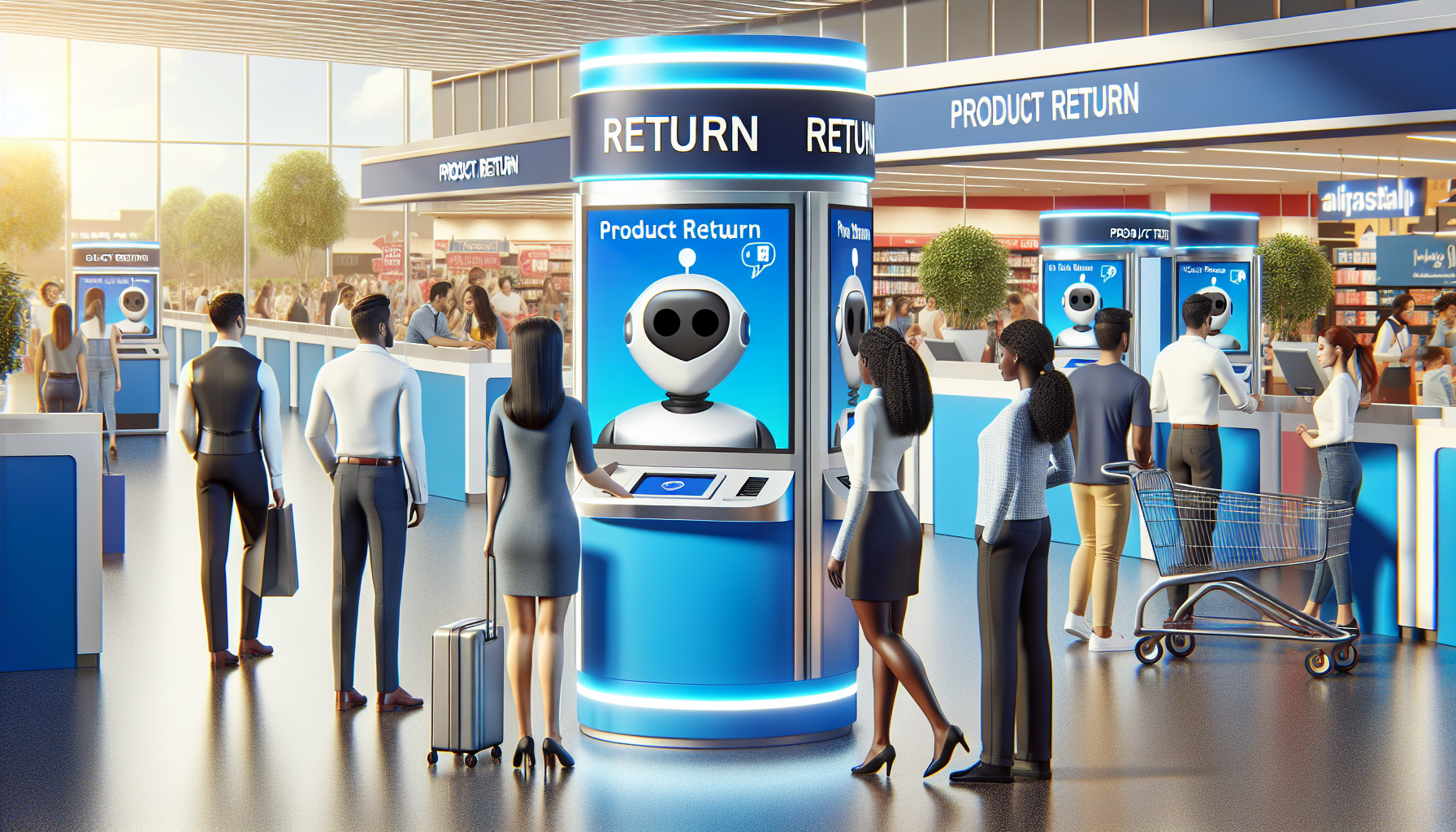
In an era where technological advancements drive business processes, the arena of customer service has fair share of transformations. Top on the list is the shift from traditional human-centered return processes to AI-powered returns. With the advent of AI receptionists handling complex product returns, businesses have seen a substantial increase in efficiency and customer satisfaction.

AI receptionists, often in the form of intelligent chatbots, help businesses streamline their return processes by handling end-to-end return requests in real time, ensuring swift response and claim processing. This cuts down significantly on resolution times, leading to a superior customer experience.
Leveraging Natural Language Processing (NLP) techniques, AI receptionists not only understand and interpret complexity in different languages but also provide accurate responses. This level of sophistication is a far cry from the archaic methods of handling returns that were often fraught with delays. IBM points out that NLP's ability to handle multilingual customer inquiries makes AI receptionists indispensable to businesses with a global customer base, leveraging AI to offer superior support.
Moreover, AI receptionists can handle high volumes of return requests simultaneously, without fatigue or the propensity to make mistakes typical of human agents. This efficiency creates a smooth customer journey that not only retains existing customers but also attracts new ones.
The benefits of utilizing AI receptionists are immense. This paradigm shift also presents an exciting future for businesses, pushing them forward into an era of efficiency, productivity, and superior customer satisfaction.
In an increasingly automated world, businesses are looking to integrate their services with Artificial Intelligence (AI) to improve efficiency and meet customer demands. Notably, AI receptionists have become a game-changer in handling complex product returns, seamlessly interacting with existing Customer Relationship Management (CRM) systems.
AI receptionists not only significantly speed up the returns process, but also provide a detailed analysis of the reasons behind returns, helping businesses to improve their product offerings. Furthermore, AI receptionists, through their complex algorithms and learning systems capable of self-improvement, are able to effectively navigate and manage the intricacies involved in product returns.
How do AI receptionists manage complex returns?
AI-driven receptionists utilize customer data stored in the CRM systems to understand consumer behaviour and patterns, anticipating customer needs even before they articulate them. For instance, when determining the validity of a product return, the AI receptionist can access the CRM system's data to confirm product purchase details, delivery dates and even past customer interactions.
This level of speed, accuracy, and expertise, derived from the synergy between AI and CRM, eliminates the need for customer service representatives to manually cross-check multiple databases, significantly reducing processing time and errors.
AI receptionists and personalized service
What's even more appealing about AI receptionists is their ability to offer personalized experiences to customers. Since the AI system is deeply integrated with the CRM, it can access and analyze customer-specific data, creating personalized return solutions that align with the customer’s preferences and the organization's policies. This results in satisfied customers and a reduced rate of product returns.
The evolution of AI receptionists handling intricate product returns efficiently, combined with the personalization offered, is paving the way for a new era in customer service automation. By understanding the nature of their interaction with CRM systems, businesses can enhance their after-sales service, drive customer satisfaction, and gain competitive advantage.
In the era of e-commerce, the need for streamlined returns management has never been more essential. Enter AI receptionists, sophisticated systems designed to handle complex product returns efficiently and effectively.
Initially, when a return request is made, the AI receptionist uses groundbreaking natural language processing (NLP) capabilities to understand and classify the request. This includes identifying the nature of the product, the reason for the return, and assessing the condition from the customer's description. Using predictive analytics, the AI receptionist can also forecast the likelihood of the request being accepted based on past data.

But that's not all. The AI receptionist is integrated with the company's inventory system to cross-verify product details. From the customer's order number, it can obtain all necessary information, such as the date of purchase and warranty details. It can also evaluate whether a returned item can be resold or if it's destined for disposal.
An interesting feature of these AI receptionists is their learning ability. By tracking product returns, they can identify trends and patterns, helping the company to pinpoint problematic products and prevent future returns.
The use of the AI receptionist extends beyond just operational efficiency. By automating returns management, companies can provide a more customer-friendly return experience. It speeds up the process, reduces the likelihood of human error, and provides a smoother interaction - all of which can improve customer satisfaction scores.
It's clear, AI receptionists and their role in automated returns management, are revolutionizing the way e-commerce businesses handle product returns. In the not-so-distant future, their presence may become a standard feature for consumers navigating the returns process.
Product returns can be complex, frustrating, and time-consuming for both consumers and businesses. However, the emergence of AI-driven technology has offered an ingenious solution. AI Receptionists act as smart intermediaries in these processes, revolutionizing the way businesses handle return requests. In this article, we will share real-world examples where AI receptionists have drastically improved efficiency and increased customer satisfaction levels in handling product returns.
In our first case study, we explore Invys, a prominent tech company specializing in retail solutions. Invys developed an AI receptionist capable of authenticating customer information, reviewing the cause of return requests, and approving them if they met the set criteria. Historically, the return process would take up to seven business days. The AI system, impressively, reduced this processing time to a mere 24 hours. Notably, this improvement was accompanied by a staggering 40% increase in customer satisfaction ratings.
In a different industry, car rental company AutoFleet, leveraged AI receptionists to manage their complex return and dispute resolution system. Before the integration of the AI receptionist, dissatisfied clients were forced to wait on long phone queues, leading to widespread frustration and dissatisfaction. The implementation of the AI receptionist led to a 30% drop in call wait times and critically reduced error rates.
Another remarkable instance of AI receptionist deployment comes from the fashion industry, courtesy of renowned clothing brand UNIQLO. Their AI receptionist managed to automate and simplify the typically complicated fashion return process, leading to an increase in return efficiency by an incredible 35%. The technology was able to review and validate return requests, identify the nature of the defect or issue, and quickly process product returns. This ultimately led to an uptick in overall customer satisfaction rates.
These case studies underscore the pivotal role of AI receptionists in transforming the way businesses handle complex product returns. The technology not only reduces processing times and costs but also significantly improves customer satisfaction and boosts brand perception.
Implementing AI receptionists to handle complex product returns can present a number of challenges for businesses in various industry sectors. However, with the right strategies in place, these challenges can be tackled effectively to streamline product return processes.

One notable obstacle includes the misclassification of return reasons. AI systems may struggle to fully understand the reasons customers provide for returning a product if the information is unclear. To mitigate this problem, AI models need access to sufficiently large and varied data sets to improve their learning and understanding. Companies may use supervised machine learning for training the AI system accurately.
Another challenge lies in the complexity of return policies. As return policies often vary widely depending on the product type, location, or reason for return, ensuring the AI accurately integrates these variations can be daunting. Developing robust software systems with complex rule-based algorithms can be pivotal to address this issue.
The third common challenge faced during AI implementation for handling returns revolves around customer interaction. Even with capabilities to understand and process human language, AI receptionists might sometimes fail to provide satisfactory service due to the lack of human touch. This can be overcome by incorporating Emotion AI, enabling the bots to understand and replicate human emotions, thereby enhancing customer experience.
In conclusion, while implementing AI receptionists for managing complex product returns is not without challenges, it is a strategic move that can benefit businesses in the long run. With strategic planning, businesses can overcome these hurdles and leverage AI's immense potential to streamline return processes, improve customer experience, and boost operational efficiency.
The introduction of AI receptionists into the customer service environment has revolutionized the way organizations manage product returns. Although still in its infancy, this technology has already shown promise in handling complex return scenarios, reducing resolution times, and improving overall customer satisfaction. However, the question remains: what does the future hold for AI in the realm of customer returns?
Advanced AI models, like GPT-3, are anticipated to tackle returns more sophisticatedly. These models are forecasted to possess the ability to understand nuanced language, anticipate customer behavior and automatically categorize return reasons. This automation will ease the burden on human agents by handling the bulk of return tasks, allowing them to focus on more account-specific services. Overall, an increase in efficiency and effectiveness is expected, with companies being able to process more returns promptly and accurately, ultimately enhancing the customer return experience.
Furthermore, the utility of AI-based receptionists is projected to extend beyond just handling returns to offering holistic post-purchase support. This includes offering predictive recommendations tailored to individual customer preferences based on past return behavior. Thus, businesses can proactively address potential issues before they occur, providing a seamless, streamlined return process for their clientele.
In conclusion, the potential of AI receptionists in handling customer returns is boundless. Through sophisticated data analysis and prediction models, they will transform the return process from a frustrating task into a fluid experience, generating customer loyalty and strengthening brand relationships. Truly, the looming emergence of advanced AI technology is charting a course for a future where superior customer service is the standard rather than the exception.
Start your free trial for My AI Front Desk today, it takes minutes to setup!








